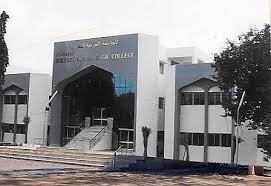A BA in Islamic Studies offers opportunities in education, interfaith dialogue, research, and cultural understanding, fostering careers in academia, religious leadership, or diplomacy, while promoting global awareness and cultural exchange.
Future Scope & Benefits for Bachelor of Arts (BA) Islamic Studies
A Bachelor of Arts (BA) in Islamic Studies offers a promising future scope with diverse career opportunities in education, interfaith dialogue, research, and cultural understanding. Graduates can pursue careers in academia, religious leadership, diplomacy, or research, contributing to global awareness and fostering peaceful coexistence among diverse communities. The degree's benefits include cultural sensitivity, strong interfaith dialogue skills, and a foundation for advanced studies in Islamic theology and scholarship, making it a valuable pathway to meaningful and impactful careers.
Future Scope for Bachelor of Arts Islamic Studies
The Future scope for graduates with a BA in Islamic Studies is promising, with opportunities in academia, religious leadership, interfaith dialogue, diplomacy, and research. The degree fosters cultural understanding and global awareness, making it valuable in an increasingly interconnected world. Graduates can contribute to bridging cultural gaps and promoting peaceful coexistence.
-
Islamic Scholar: Graduates can become Islamic scholars, theologians, or religious educators, providing guidance and religious instruction within their communities or as part of academic institutions.
-
Imam or Religious Leader: BA in Islamic Studies graduates can serve as imams, leading congregational prayers and offering spiritual leadership within mosques and Islamic centres.
-
Educator: Graduates can become teachers or professors of Islamic Studies at schools, colleges, or universities, educating the next generation about Islamic history, culture, and theology.
-
Interfaith Dialogue: Islamic Studies graduates can engage in interfaith dialogue and bridge-building efforts, promoting understanding and cooperation between different religious communities.
-
Islamic Counseling: Some graduates may choose to become Islamic counsellors, providing spiritual and psychological support to individuals and families facing personal challenges.
-
Islamic Banking and Finance: With an understanding of Islamic finance principles, graduates can pursue careers in Islamic banking and finance, working in roles such as financial analysts or advisors.
-
Islamic Nonprofits and Charities: Graduates can work for Islamic nonprofit organizations, charities, and humanitarian agencies, contributing to social welfare and development projects.
-
Research and Writing: BA holders can engage in research and writing, producing scholarly work, articles, and books on topics related to Islamic studies.
Benefits of BA in Islamic Studies
A Bachelor of Arts in Islamic Studies offers several benefits. Graduates gain a deep understanding of Islamic culture, history, and theology, fostering cultural sensitivity and interfaith dialogue skills. The degree opens doors to careers in academia, religious leadership, diplomacy, and research, contributing to global understanding and fostering peaceful coexistence among diverse communities. It also provides a strong foundation for further studies and advanced degrees in Islamic studies and related fields.
-
Spiritual Fulfillment: Pursuing Islamic Studies allows for spiritual fulfilment by deepening one's knowledge of Islam and its teachings.
-
Community Leadership: Graduates can play vital roles in their communities, providing religious leadership, guidance, and support.
-
Teaching and Education: A BA in Islamic Studies provides the opportunity to educate others about Islam, promoting understanding and tolerance.
-
Interfaith Engagement: Graduates can contribute to interfaith dialogue, fostering mutual respect and cooperation among diverse religious groups.
-
Cultural Awareness: The program fosters cultural awareness and a deeper understanding of Islamic history, art, and civilization.
-
Ethical Decision-Making: Islamic Studies education emphasizes ethics and moral values, guiding graduates to make ethical decisions in various aspects of life.
-
Communication Skills: Graduates develop strong communication skills, which are valuable in religious education, public speaking, and community outreach.
-
Critical Thinking: The study of Islamic texts and theology encourages critical thinking and analytical skills.
-
Global Perspective: Islamic Studies offers a global perspective, as it often explores Islam's history and presence in various regions around the world.
-
Career Versatility: Graduates can pursue diverse career paths within and beyond religious contexts, leveraging their knowledge and skills in various fields.
-
Personal Growth: Studying Islamic Studies can lead to personal growth, self-discovery, and a deeper connection to one's faith and spirituality.
-
Lifelong Learning: Islamic Studies is a field where individuals can continue to learn and deepen their understanding of Islam throughout their lives.
 3 Years
3 Years
 Under Graduate
Under Graduate
 Arts
Arts
 Full Time
Full Time











 back
back

